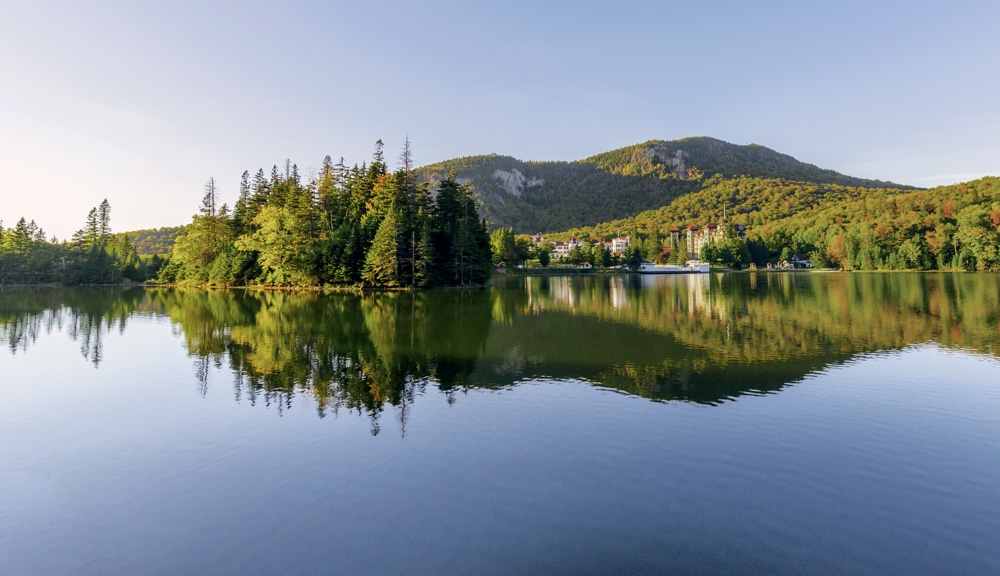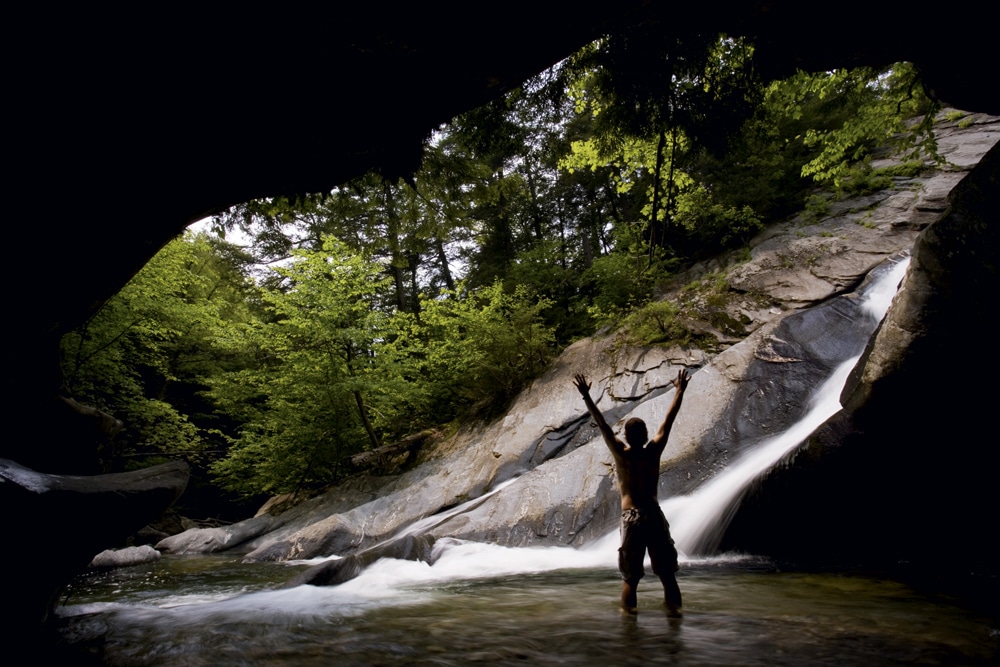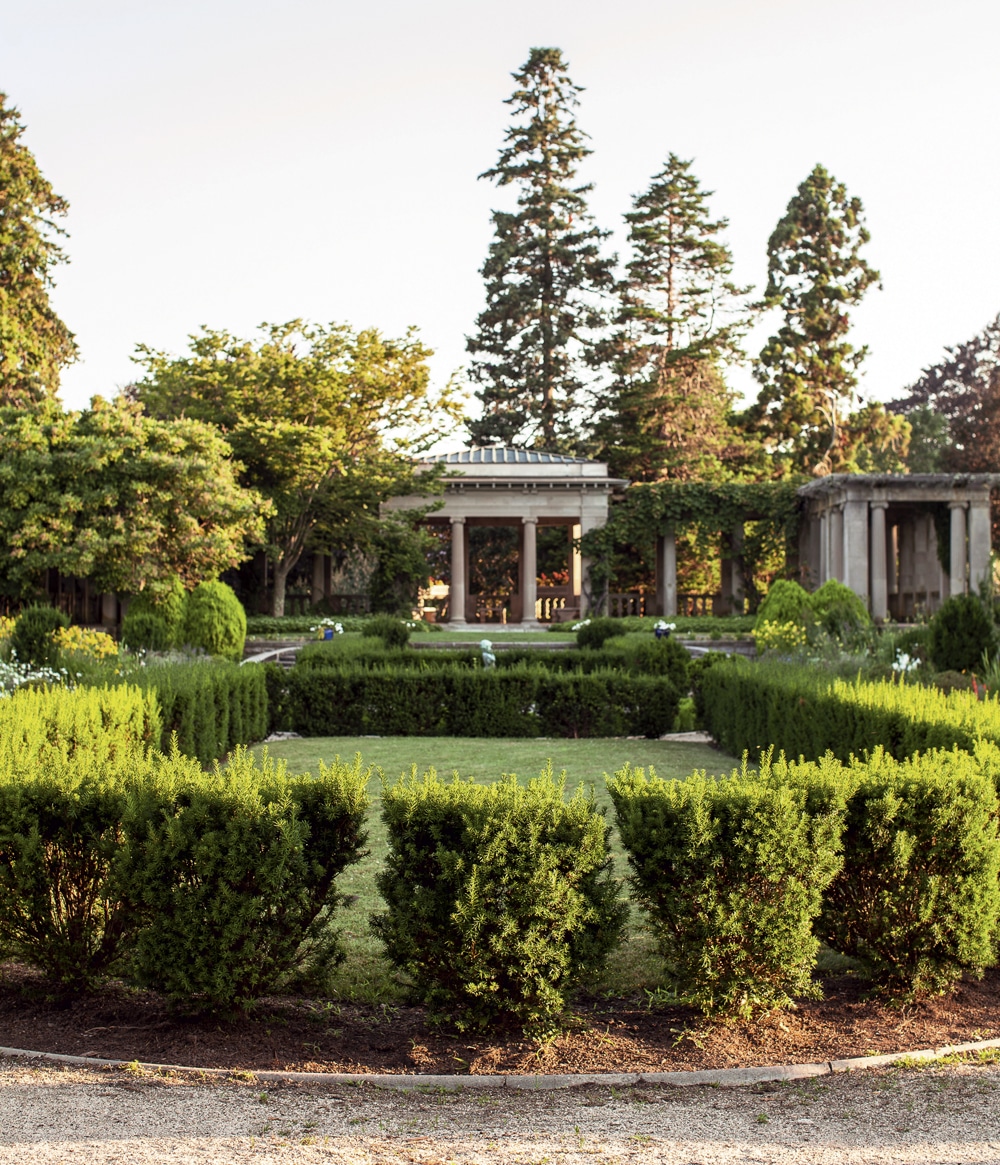Under-the-Radar New England State Parks
Here are seven hidden New England state park gems where you can find a retreat to restore body, mind, and spirit.

As lovely as this view of Lake Gloriette is, it gets even better from atop Table Rock in nearby Dixville Notch State Park, New Hampshire.
Photo Credit : Bruce LeuttersWhile New England may have only a handful of parks with “National” in their name, it is blessed with an enviable collection of state parks, including many whose names are known well beyond our region’s borders. What hiker doesn’t dream of conquering Baxter’s Mount Katahdin? Who would want to miss the foliage fireworks of Franconia Notch? But just as appealing, especially now, are the parks with a quieter appeal, offering swaths of land to roam while rarely running into crowds. Here are seven hidden gems where you can find a retreat to restore body, mind, and spirit. —Steve Jermanok
Dixville Notch State Park
Dixville, NH
The narrowest of New Hampshire’s famed notches, Dixville, lies in its northern tier of the state, across from the legendary Balsams Grand Resort. For 145 years, until it closed in 2011, guests at this Gatsby-esque property could look up from one of the Adirondack chairs on the veranda and be rewarded with a majestic view of rock walls and twisted granite.
Once managed by Daniel Webster, Dixville Notch is now part of a namesake state park, replete with waterfalls, flume, and hiking trails. At only 127 acres, it’s by far the smallest park on this list—but take a hike up to the ledge known as Table Rock, and you’ll quickly see why it made the cut.
The two options to the top are the moderate 1.5-mile Table Rock Trail and the more strenuous 2.8-mile Three Brothers Trail; many hikers combine the routes in order to visit Huntington Falls on the way. (Note: Though the ascent is only 751 feet, it’s steep and the footing can be muddy.) Table Rock itself sits like a gangplank over sheer walls of rock, and for those not queasy about heights, it’s a memorable place to picnic and peer over the cliffs to Route 26 below. The view is stunning, encompassing the historic resort, Lake Gloriette, and the sharp ledges and hills that form the craggy notch. nhstateparks.org
Sticking Around: There are rumors that the Balsams will reopen, but until that time, stay at Paradise Point Cottages, 25 minutes down the road, on the shores of beautiful Umbagog Lake.
Going to Town: In Errol, you can rent a canoe or take a guided trip with North Waters Outfitters to explore Umbagog National Wildlife Refuge in hopes of spying one of its nesting pairs of bald eagles.
October Mountain State Forest
Lee, MA
In 1899, former Navy Secretary William C. Whitney bought 11,000 acres in the heart of the Berkshires and stocked it with imported moose, elk, and buffalo as a gift for his son. However, it turned out the younger Whitney—not being much of a Hemingway-style hunter—rarely ventured into the forest, and the land was soon turned over to the state. Today, at 16,500 acres, October Mountain State Forest is the largest green space in Massachusetts.
One trip to these dense woods and lost ponds, and you realize why locals would like to keep this park their secret. Set in high-plateau country, with elevations ranging from 1,800 to 2,000 feet, it’s an ideal place to cool off in summer. There’s a relatively easy nine-mile stretch of the Appalachian Trail that’s suited to family hikes, while Buckley Dunton Reservoir, stocked with bass and pickerel and hidden amid the hardwoods, beckons to anglers.
Wildlife in this part of the state is abundant: Chances are you’ll see deer, beavers, maybe even a bald eagle. But as local legend has it, there have been some bizarre sightings. Whitney’s surviving animals were sold to the Bronx Zoo—or were they? If you hear something rustling in the woods, look closely…. mass.gov/state-parks
Sticking Around:Choose from 44 campsites and three yurts that can accommodate four to six people.
Going to Town: For a meal, there’s no better slice of Americana than Joe’s Diner in Lee. Norman Rockwell’s 1958 painting The Runaway, of a policeman talking to a young boy at a lunch counter, was partly based on this diner.

Photo Credit : Jerry Monkman/Ecophotography
Jamaica State Park
Jamaica, VT
Here you can bike or hike to one of Vermont’s most majestic waterfalls, learn about local ecology and history, and cool off in a swimming hole. Add a riverside campground only a half-mile from the amenities of town, and you’ve hit the jackpot.
A former railroad bed is now the 36-mile West River Trail, more than two miles of which runs through this 772-acre park and is dotted with nine nature stops. Accompanied by the rushing music of the West River, you’ll meander through a forest of birch, hemlock, spruce, ash, and maple. The payoff is spectacular Hamilton Falls, which tumbles down 125 feet of granite ledges, making it one of Vermont’s highest waterfalls. Expect to find dog walkers (pups are permitted everywhere except swimming areas), horseback riders, mountain bikers, and joggers enjoying the level trail. And if it’s a warm day, you can take a dip in Salmon Hole, a classic swimming hole located by the parking lot.
If you bike or walk the length of the trail, you’ll reach a gravel road that leads to an engineering marvel, the Ball Mountain Dam. Built between 1957 and 1961 to control floods on the West River, the curving wall of the dam is 247 feet tall and 915 feet long—a sight to behold. vtstateparks.com
Sticking Around:Reserve one of the 41 spacious tent sites or 18 lean-tos, some positioned along the river.
Going to Town:Down the road in Jamaica, stock up on groceries and sandwiches at D&K’s or warm up with a plate of pad thai at Fran’s Kitchen.
Arcadia Management Area
Hope Valley, RI
There’s something liberating about the sport of mountain biking. You get the opportunity to pedal down trails and dirt roads unobstructed by cars, free to ditch your map and go wherever the route takes you, while breathing in fresh air and listening to birdsong.
This is especially true at a place like Arcadia Management Area, where on any given day you’ll pass maybe a handful of other recreationists on the 30-plus miles of trails. This elbow room comes courtesy of both the park’s location—not on the heavily trafficked coast, but inland, less than 20 minutes from the Connecticut border—and its massive size. At some 14,000 acres, this is Rhode Island’s largest green space, and it’s all yours to explore.
Hop onto your bike and in moments you’ll be alone in a shaded forest, riding past ambling creeks and quiet fishing holes. A prime destination is gorgeous Breakheart Pond, the largest body of water at Arcadia, which you can circumnavigate; for a longer ride, try the 13-mile perimeter trail that loops the park.
Arcadia is not just the province of the two-wheeling types, however. Anglers, boaters, hunters, hikers, and horseback riders are welcome here too—and there’s plenty of room for them all. riparks.com
Sticking Around:If you like roughing it, get a permit for one of the handful of backcountry campsites, or book the shelter at Frosty Hollow Pond. Bonus for equestrian types: The LeGrande Reynolds Horsemen’s Area permits camping with your horse.
Going to Town:Rent kayaks at the Kayak Centre in nearby Wickford, and you’ll soon be swimming off a deserted island in the harbor.
Quoddy Head State Park
Cobscook Bay State Park
Lubec/Edmunds, ME
Set atop soaring cliffs carved by pounding surf is Quoddy Head State Park’s best-known attraction: the 49-foot-tall candy-cane-striped West Quoddy Head Light, erected in 1858. Perched on the easternmost point of the contiguous U.S., this lighthouse is the reason most people visit Quoddy Head State Park, to snap an Insta-worthy photo and then go off on their merry way. Don’t make that mistake!
Across its 532 acres, Quoddy Head offers some of the best shoreline trails in the state. A favorite is the Coastal Trail, a four-mile round trip that leads through forest while still providing amazing ocean views. The crisp scent of pines mingles with sea mist as you hike to such attractions as Gulliver’s Hole, High Ledge, and Green Point, which offers paths down to a beach. Across the Quoddy Narrows, you can gaze at the rugged shoreline of New Brunswick’s Grand Manan Island. Watch for fishermen returning from their mornings at sea, seals sunning on the rocks, and bald eagles overhead.
After exploring Quoddy Head, hop in the car for the second half of this “two-fer” recommendation. Thirty minutes away lies Cobscook Bay State Park, which has a few short hikes of its own but is best known as an oceanside camping haven. Plus, given that the average tidal change here is 24 feet, clamming is a popular pastime in season: Dig one peck per person, then sit around the campfire for a good old-fashioned clambake. maine.gov/dacf/parks
Sticking Around:Surrounded by water on three sides, the 100-plus campsites at Cobscook are some of the nicest in the state.
Going to Town:Head into Lubec to tour the former sardine canneries and then grab fresh-caught seafood at Frank’s Dockside Restaurant.

Photo Credit : Julie Bidwell
Harkness Memorial State Park
Waterford, CT
In 1907, Edward and Mary Harkness moved into their 42-room Italianate mansion, Eolia, on the Connecticut shoreline. It was the crown jewel of a 230-acre property that also boasted a working farm with dairy cows and chickens, vegetable and flower gardens, a five-car garage—even a nine-hole golf course. When Mary Harkness died in 1950, she bequeathed it all to the state, noting in her will that the grounds be used “for the purpose of promoting good health.”
By all means, help fulfill Mary’s edict by strolling the paths through the gardens; in May, this is quite a treat, thanks to the profusion of perennials. The great expanse of lawn slopes down to the shore, perfect for a walk amid sand and shells. If you’ve registered for a day license and brought your gear, you can head to the rocks to lure stripers and blues. Prefer picnicking to fishing? Find a spot on the manicured grounds, enjoy a peaceful meal, and dream of the Gilded Age. portal.ct.gov/deep/state-parks
Sticking Around:Though there’s no camping at Harkness, just a 15-minute drive brings you to the Inn at Harbor Hill Marina in Niantic, overlooking the harbor.
Going to Town:Head to nearby Ocean Beach in New London to go for a dip, then make the requisite stop at Captain Scott’s Lobster Dock for lobster rolls alongside the Thames River.


